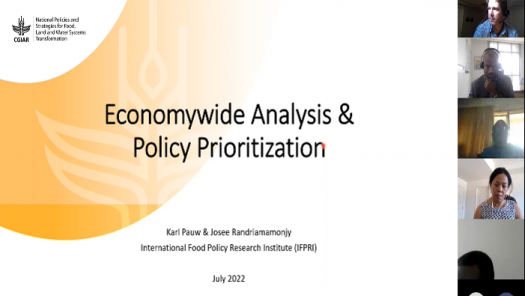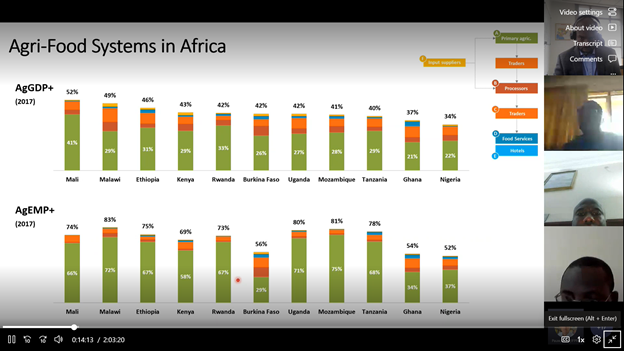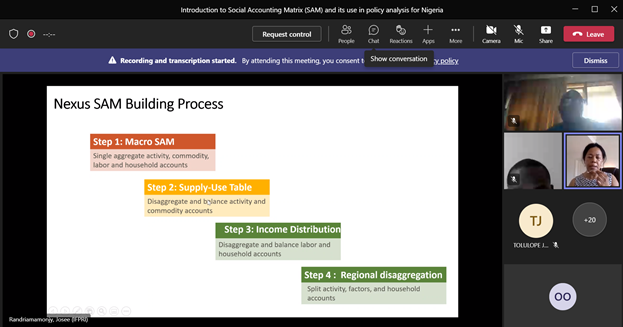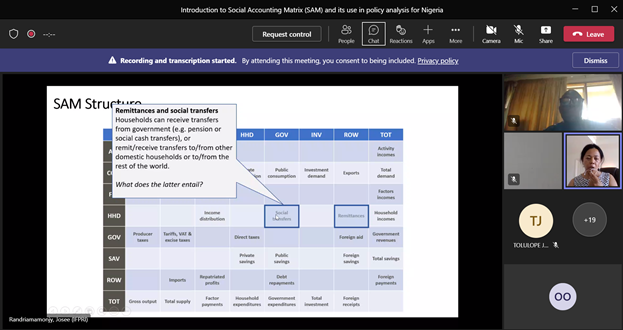
The International Food Policy Research Institute (IFPRI) hosted the first in a series of capacity-sharing workshops under the CGIAR National Policies and Strategies for Food, Land and Water Systems Transformation (NPS) Initiative1 on July 7, 2022. The training, which included government, policy think tanks, and other stakeholders introduced the social accounting matrix (SAM) as a policy and investment tool for economy-wide analysis and transformation.
The training had 25 participants joining virtually from the National Bureau of Statistics (NBS), the Nigerian Governors Forum (NGF), and the Nigerian Institute of Social and Economic Research (NISER), as critical stakeholders of the NPS project in Nigeria. Pauw, NPS Food System Economywide Modeler and Senior Research Fellow at IFPRI in Washington, DC; and Josee Randriamamonjy, NPS Data Development Manager and Senior Scientist/Research Fellow at IFPRI in Washington, DC conducted the training sessions. Kwaw Andam, Nigeria NPS Lead and Country Program Leader of IFPRI Nigeria, and Hyacinth Edeh, NPS Nigeria Coordinator of Advocacy and Stakeholder Engagement and Country Program Manager at IFPRI Nigeria, facilitated the training session.
The training was aimed at building the capacity of NPS partners on the use of SAMs as a systematic tool for economy-wide analysis and policy prioritization, and to prioritize the most appropriate investments and suitable policies that can transform the Nigerian agricultural food market and system. Subsequent pieces of training in the capacity-sharing workshops series will provide a more in-depth and practical look into broader aspects of SAM and other policy and investment tools.
Karl Pauw, Senior Research Fellow; IFPRI, facilitating training on Economywide Analysis & Policy Prioritization
Screenshot: Omobolanle Onilogbo/IFPRI
In the Economy-wide Analysis and Policy Prioritization session, Karl Pauw highlighted the importance of economy-wide analysis in keeping track and understanding the process of agricultural transformation through policies and investments and making it more accessible to policymakers. He provided an overview of the stages of agricultural transformation, how to define agri-food systems, and how to identify good indicators and drivers of Agriculture Gross Domestic Product (Ag-GDP) growth. The Rural Investment and Policy Analysis (RIAPA) modeling and data system, developed by IFPRI, was introduced along with an explanation on how RIAPA can be used to project various agri-food systems and welfare outcomes using the combination of data, investment tools, and other model inputs, giving an overall outlook on how agricultural growth can link to development outcomes.
Josee Randriamamonjy, Senior Scientist; IFPRI, facilitating training on Introduction to SAM
Screenshot: Omobolanle Onilogbo/IFPRI
Josee Randriamamonjy led the Introduction to SAM session. She summarized the key roles of economy-wide models and identified SAM as an economy-wide database, and the starting point of an economy-wide model. Explaining further the function of SAM to capture the flow of income, total savings, and investments through every sector in the agricultural market for a given year, a step-by-step breakdown of each activity in the SAM structure was given for a clear process of how it works and can be used. The building process of a SAM, linkages, and leakages in a SAM framework and the assumptions for SAM multiplier models were also explained.
After the training sessions, participants asked questions and engaged in a discussion with the trainers.
Olubunmi Akanbi, Principal Agriculture Economist, NGF, noted that NGF, as “a policy and resource center that serves as the technical and administrative arm of the Nigerian governors, looks forward to a fruitful partnership” under NPS. Bishop Ohioma Enebi, Assistant Director, NBS, also noted that “as custodians of data in Nigeria, we are satisfied with the training and looking forward to more training of this magnitude.”
As a final note to the participants, participants were reminded that the overall purpose of the training was to build the capacity to develop the SAM database using national data, with expert knowledge on what type of data the database requires.
Subsequent capacity-sharing workshops will involve creating core SAM users and policy analyses.
Read about the Launch of the Nigeria National Policies and Strategies (NPS) Seminar Series here.
1 CGIAR launched NPS with national and international partners to build policy coherence, respond to policy demands and crises, and integrate policy tools at national and subnational levels in six countries in Africa, Asia, and Latin America. CGIAR centers participating in NPS are The Alliance of Bioversity International and the International Center for Tropical Agriculture (Alliance Bioversity-CIAT), International Food Policy Research Institute (IFPRI), International Livestock Research Institute (ILRI), International Water Management Institute (IWMI), International Potato Center (CIP), International Institute of Tropical Agriculture (IITA), and WorldFish. We would like to thank all funders who supported this research through their contributions to the CGIAR Trust Fund.







